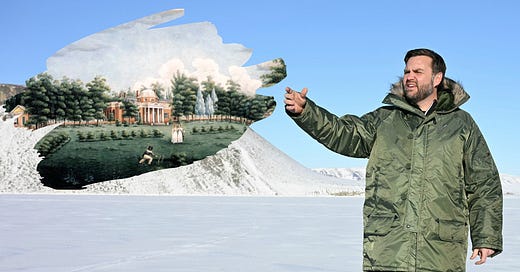JD Vance’s Claremont Award Reveals His Dark Vision for America
What he said about bloodlines, immigration, and extremism should alarm anyone who believes in democracy.
On a warm July evening, Vice President JD Vance arrived in Rancho Santa Fe, California, to accept the Claremont Institute’s prestigious Statesmanship Award. The black-tie gala was exactly what you’d expect: champagne flutes clinking under chandeliers, tables of well-heeled donors and ideological true believers, all gathered to honor a man they see as the future of American leadership.
On paper, the event appeared to be a conservative intellectual salon. The emcee was Charlie Kirk, founder of Turning Point USA, whose youth-oriented MAGA movement has made him a fixture of the right-wing ecosystem. Seated at the head table was Michael Anton, author of the infamous “Flight 93 Election” essay that painted Trump’s 2016 victory as a desperate act of national self‑preservation. Hosting it all was Claremont President Ryan P. Williams, whose own career has been devoted to transforming the think tank into the intellectual home of Trumpism.
From a distance, it might have looked like a routine political fundraiser. However, a closer look reveals something much stranger and darker, a celebration of an ideology that reveres hierarchy over democracy, bloodlines over beliefs, and the past over the future.
We just hit 17,000 subscribers—thank you!
Get exclusive access for just $1/week or $52 a year.
Get exclusive analysis and fearless reporting you won’t find in corporate media.
The Illusion of Statesmanship
Claremont was founded in 1979 as a home for scholars who believed that America’s Founding principles, especially the vision of equality and liberty laid out in the Declaration, deserved to be defended. For a time, it did just that, producing high‑minded commentary rooted in Lincolnian ideals. However, over the past decade, it has evolved into something else entirely, a glossy intellectual veneer for a strain of nationalism that is at once exclusionary, illiberal, and deeply nostalgic for a social order where everyone “knew their place.”
That they held their gala in ultra-diverse, affluent Southern California only deepened the irony. The lush surroundings may have felt a world away from the immigrant communities and working-class families they dismiss as threats to “cohesion,” but that contradiction barely registered in the Rancho Santa Fe room so devoted to romanticizing an America of the past.
The Philosopher Behind the Curtain
To understand the worldview Claremont champions and Vance so eagerly parrots, you have to start with Leo Strauss. Strauss, a German-Jewish émigré and political theorist, taught that liberal modernity inevitably descended into chaos. His solution was unapologetically elitist. He argued that society should be guided by a select few who understand the “perennial truths” about hierarchy and order, while the masses are managed with noble lies.
That philosophy runs like a current through Claremont’s work and through the men it has influenced. Stephen Miller, the architect of the Trump‑Vance administration’s draconian anti‑immigration policies, rose up in Straussian circles. Billionaire Peter Thiel, Vance’s chief patron, once wrote an essay called “The Straussian Moment,” where he argued that liberal democracy had failed and that America needed to return to a more ordered, hierarchical civilization. Thiel, who famously declared “I no longer believe freedom and democracy are compatible,” bankrolled Vance’s Senate campaign and helped install him in the vice presidency.
What unites them all — Strauss, Miller, Thiel, Claremont, and now Vance — is a belief that equality and democracy are not the solution but the problem.
Don’t know Miller and Thiel? See our previous reporting here:
Note: These articles are more than 45 days old and now live in the archive. Consider becoming a paid subscriber for full access to the full 750+ article archive and exclusive perks.
What Did Vance Actually Do?
So why give Vance an award? What has he actually done in his six months as vice president? Not much, at least not in the way most of us think about leadership. There have been no landmark policies, no courageous decisions, no great unifying moments. What he has done, however, is speak the language of Claremont perfectly.
Vance has loudly rejected the idea of America as a creedal nation — one bound by shared ideals — and instead argued that it properly belongs to the “descendants of the Founders.” He has framed immigration as an existential threat to social cohesion, praised “domestic extremists” over immigrants who “merely” share American values, and mocked civil-rights organizations for exposing hate.
If you are Claremont, that’s more than enough. The award isn’t about merit; it’s about loyalty.
Words That Betray
Standing at the podium, Vance made his case plainly. After spending the majority of his speech focused on New York City mayoral nominee Mandami, he turned to his bread and butter: white Christian nationalism.
“Identifying America just with agreeing with the principles… would include hundreds of millions, maybe billions of foreign citizens… By the opposite token, conceiving of American citizenship purely as an idea would reject a lot of people that the ADL would label as domestic extremists, even though those very Americans had their ancestors fight in the Revolutionary War and the Civil War.”
It was a remarkable statement, not least because it dismissed the Anti‑Defamation League (ADL), the century‑old Jewish civil rights group that tracks hate groups and fights antisemitism, as an illegitimate arbiter of extremism. The hypocrisy practically wrote itself. This administration has spent months weaponizing antisemitism accusations against political enemies, while mocking the very Jewish organizations actually fighting it.
To Vance and his audience, though, this wasn’t hypocrisy; it was courage.
The Hypocrisy of the Man
The irony of Vance’s vision of America is hard to overstate. He is married to an Indian‑American woman whose family would not have been allowed to immigrate under the system he seems to favor. His own mixed‑heritage children would, by his logic, qualify as lesser citizens. His Appalachian‑Rust Belt roots, the source of his best‑selling memoir, would have been disdained by the very Founders he now venerates.
Even his much‑touted “Appalachian” identity doesn’t hold up under scrutiny. Middletown, Ohio, isn’t even part of Appalachia. He built a brand on telling the story of a struggling community, then turned around and scolded it for being what it is. Now, he acts like the shining example of the exception to the rule, the Ivy League statesman who overcame his flawed family and peers.
The Originalists’ Fantasy
In their zeal to recover the Founders’ America, Vance and Claremont have embraced the worst of it. In many ways, they are espousing a truly troubling radical originalism, embracing the shame of our history, rather than the promise. The Founders envisioned a republic for white, land‑owning men, where everyone else — women, enslaved people, Indigenous nations, and immigrants — stood outside the circle of belonging. For all their talk of “timeless principles,” Claremont’s vision seems more interested in preserving those exclusions than overcoming them.
It is, at bottom, a plantation fantasy, cloaked in parchment and patriotism.
Statesmanship or Spectacle?
For all his self‑seriousness, Vance’s tenure so far has been defined more by gaffes than governance. He mocked Ukrainian President Zelensky for not wearing a suit during wartime. He arrived in Greenland clad in a cartoonishly oversized puffer coat that promptly went viral. When he arrived in San Diego for the Claremont gala, protesters outside his dinner heckled him with cries of “Get the hell out of California!”
If this is what passes for statesmanship, the bar is so low it’s subterranean.
The America They Dream Of
The Claremont gala was not a celebration of courage or achievement. It was a coronation for a man willing to say the quiet part out loud, that this country belongs to a few by birthright, and the rest of us should be grateful to serve.
What Vance revealed in his speech was not a vision for America’s future, but a nostalgia for its past, a past where hierarchy reigned, power was inherited, and everyone else was told to know their place.
What Vance and Claremont are offering isn’t statesmanship; it’s plantation mastership, draped in patriotism. The America they dream of doesn’t include you, me, or even their own family.
We just hit 17,000 subscribers—thank you!
Get exclusive access for just $1/week or $52 a year.
Get exclusive analysis and fearless reporting you won’t find in corporate media.
Bibliography:
“Vice President JD Vance Honored with Claremont’s Statesmanship Award.” The Claremont Institute, July 8, 2025.
“Transcript: JD Vance’s Speech at The Claremont Institute’s Statesmanship Award Event.” Singju Post, July 10, 2025.
“JD Vance Heckled, Booed at California Dinner.” Newsweek, July 8, 2025.
“JD Vance Heckled by Protestors for Dining at California’s Sushi Restaurant amid Texas Flood Tragedy.” Hindustan Times, July 8, 2025.
“Vice President Vance’s Claremont Institute Speech: Complete Annotated Transcript.” The Editors, July 10, 2025.
“J.D. Vance’s Anti‑Declaration.” Unpopular Front, July 9, 2025.
“Revealed: JD Vance Promoted Far‑Right Views in Speech About Extremists’ Book.” The Guardian, August 22, 2024.
“Claremont Institute.” Wikipedia. Accessed July 2025.
YouTube. “Vice President JD Vance Accepts The Claremont Institute Statesmanship Award (July 5, 2025).” The Claremont Institute, July 5, 2025.









What can I say besides to say that it is coming. America will never be free of slavery. We have largest population of incarcerated, working for free, in the world. We did not abolish it. We just change its name & leveled the playing so most any poor person can be enslaved. I know 1st hand how it feels to do forced, unpaid labor in hot fields working a eye how hoe or shovel with the constant threat of psychological torture waiting.
Thank you sooo much for Great Writing!
But, you didn’t mention that he has obscured his own birth name, plus his first name, (middle name listed as Donal rather than his hated Donald in a small military writing award which had been posted during his VP-choosing days.)
He seems more like the plantation foreman instead of ‘ living in The Big House’ than the English rejects who landed in Virginia or Mass.